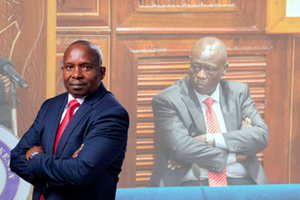Inside Kenya’s betting craze

A graphic depicting an online betting site.
Between July 2022 and the end of June 2023, Kenyans staked a staggering Sh88.5 billion purely in online bets.
This figure is generated by factoring the Sh6.64 billion excise taxes on betting paid to the Kenya Revenue Authority (KRA) by gaming firms in the 2022/23 financial year, which represents 7.5 per cent of wager amounts by punters.
Breaking down the astonishing wagers into smaller bits, this would imply that Kenyans placed wagers of Sh242 million daily, which is Sh10.1 million hourly, Sh168,333 every minute or Sh2,806 every second.
In contrast, were Kenya’s gambling industry a marketplace, it would rival the Nairobi Securities Exchange, whose turnover last year only edged wagered total slightly at Sh94.2 billion.
By themselves, punters would be able to fully fund the budgets set aside for manufacturing and industrialisation, social protection, governance and justice and sports, culture, recreation and tourism while still getting to keep the proverbial change.
Kenya’s betting craze is alive and well despite what has been a heavy crackdown on existing gaming firms and stiff taxation year after year.
In 2019 for instance, the Interior ministry under then Cabinet Secretary Fred Matiang’i went to war with gaming firms with a set of criminal allegations, including money laundering and tax evasion.
While the government actions appeared to drain the swamp, like roaches who are reported to have the potential of surviving a nuclear attack, the industry has soared back to the skies with thousands, if not millions, of devoted followers, all itching to make a killing .
Punters have braved risks presented by the game of chance and the certainty of heavy taxation to keep the lights on for a multibillion-shilling enterprise.





